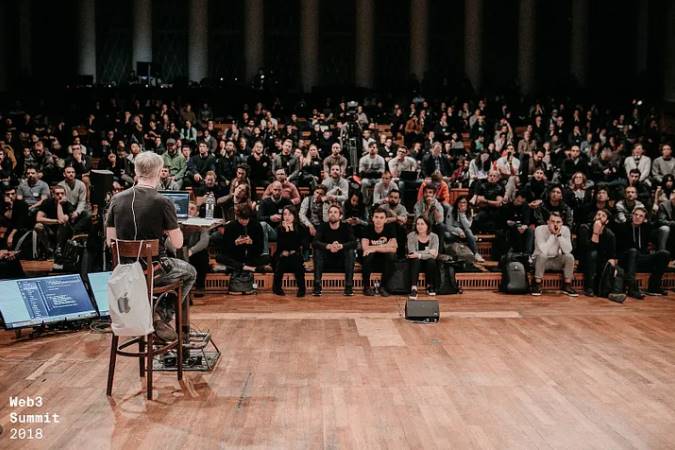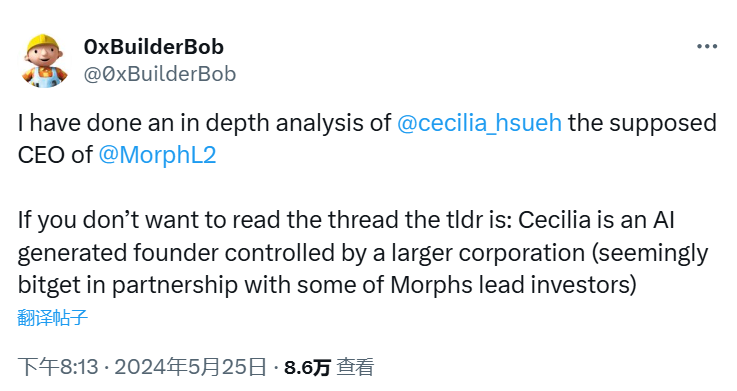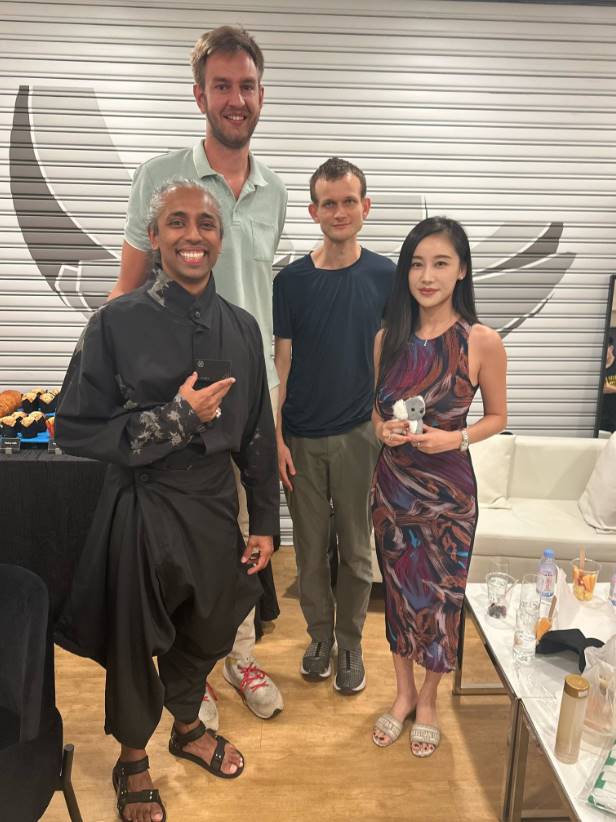From Monad to Berachain and then to Morph, the irreplaceable role of the unique cultural symbol of the "founder" in these projects is gradually becoming evident.

What role should founders play in Web3 projects?
Should they be purely technical experts, or marketing-savvy promoters, or perhaps community builders who excel at creating an atmosphere? Aside from the early industry leaders in the crypto world, very few founders of crypto projects have successfully stepped into the spotlight over the years and provided actual benefits to project development.
However, with the continuous infiltration of attention economy and consumer trends into the Web3 world, new projects like Monad and Berachain are beginning to demonstrate the irreplaceable importance of the "founder" as a unique cultural symbol of the project:
Founders with strong personal charisma or personality traits can serve as tangible representatives of the project, directly reaching the broadest (potential) community users, thereby gathering a loyal community even before the mainnet is launched, creating a community atmosphere that can be described as religious. This has almost become a core element of success for Web3 projects in the new era.
The "Role Evolution" of Web3 Founders
In the Web3 world, a community is not just a collection of users; it is a culture, a belief, a force, where all community members gather together due to shared values and goals.
For the community, the cultural core that effectively binds them together, beyond the project vision, is actually the "personal charisma of the founder."
We can take Gavin Wood as an example, who is also the best early sample of a project founder with strong personal charisma in the Web3 industry.
Although the development of the Polkadot project and its community governance has faced criticism, Gavin Wood, as a co-founder of Ethereum and the founder of Polkadot, was initially praised not just for his deep technical expertise but also for his outstanding market insight and communication skills:
It is precisely because of this that when Gavin Wood created and marketed concepts like Polkadot and "one-click chain creation" in the early days, he could successfully transform complex technical concepts into easily understandable user experiences and quickly attract a large number of users and investors through effective marketing.
Many old players in crypto likely still vividly remember the scene in 2018 when Gavin Wood demonstrated how to develop a blockchain in 15 minutes at the Web3 Summit. Regardless of how ordinary this narrative may seem today, at that time, it truly shocked many who did not understand the technology, as if a new era had begun.

This also illustrates that being able to help ordinary users understand and accept new narratives and concepts is crucial for a project's promotion and development. Project founders not only need solid technical skills but also require sharp market insight and excellent communication abilities to stand out in a competitive market and attract more users and investors.
Years have passed, and the focus of competition in the Web3 field has gradually shifted from technical narratives to large-scale commercial implementation, which in some ways means that the new generation of Web3 founders needs to accurately grasp market trends and user needs, in addition to technical capabilities, and effectively communicate with investors, community users, partners, and other parties.
In simple terms, in the new wave of Web3 consumer DApps, the speed and breadth of information dissemination determine the project's influence, which requires founders to excel in communication with all parties, clearly convey the project's value and vision, attract investors' attention, win users' trust, and establish solid relationships with partners.
Furthermore, Web3 project founders need to find a delicate balance between technology, marketing, and community governance to attract numerous community members who are almost like followers, creating a community atmosphere that is not blind worship but based on a shared expectation and belief in the project's future, uniting everyone to contribute to the project's development.
Founders are the "Key Few" in Building Communities
In the Web3 field, consumer narratives are becoming an important force driving industry transformation. Compared to traditional technical narratives, consumer narratives focus more on user needs and experiences, requiring users to be placed at the core driving force of the project, which necessitates a link to reach as many (potential) community users as possible and bring them together.
Berachain: From NFT Community to Blockchain Network
For the currently popular Berachain, NFTs can be considered the project's origin and unique cultural symbol, as Berachain co-founder Smokey is a master at creating community atmosphere:
In 2021, he initially jokingly expressed a desire to create 100 cannabis-consuming bear NFTs, allowing these initial NFTs to continuously rebase, thus giving rise to second and third generation NFTs. This idea garnered a lot of attention and support, and from there, it officially started as an interesting NFT project, successfully distributing within the DeFi community.

This unique approach attracted a group of technically skilled and communicative individuals, and as the community grew, they actively added various new gameplay mechanisms to the NFTs, maintaining community engagement.
It was during this community co-creation process that Smokey identified a market gap and chose to gradually evolve from the NFT community into building a blockchain, so from this perspective, this transition was not coincidental.
Monad: The Flagbearer of "Religious" Community Building
Objectively speaking, many Web3 projects today claim to create unique cultures and communities, but very few truly achieve this to the fullest extent, and Monad is one of the rare success stories.
In addition to the technical narrative of "EVM-compatible high-performance L1," Monad founder Keone Hon, as a typical tech-oriented founder, strongly advocates for true decentralization, emphasizing Monad's low hardware requirements, allowing anyone to run a full node, thus achieving genuine decentralization.
It is precisely because of this commitment to decentralization that Monad has been able to introduce a completely free meme culture, closely integrating it with community development, paving a new paradigm for community building in Web3 projects:
Whether it is creativity, technology, or cultural expression, as long as it is within the Monad community, a place can be found for it, such as through various meme creation contests and themed events, stimulating the creativity and participation of community members, allowing everyone to unleash their imagination and contribute exciting meme works to the community.
These works not only spread widely within the community but also attract external attention, further expanding Monad's influence. In this process, Monad has gradually formed a unique community atmosphere—empowering users with a sense of participation and recognition, allowing every member to feel their value and importance.
People are no longer just users of the project but also creators and promoters of the project. This strong community cohesion has also propelled Monad to generate a greater market presence than most heavyweight players even before the mainnet is launched.

AI-Generated Morph Co-Founder?
Interestingly, there was previously a post questioning Morph founder and CEO Cecilia Hsueh, and the angle of the doubt now seems almost "absurd"—the author believed Cecilia was perfect in every aspect, almost like a "hexagonal warrior," and thus suspected she was an "AI-generated CEO."

Of course, as Cecilia Hsueh appeared at offline events like "Consumer Day" in Singapore, this doubt naturally dissipated, but it also reflects a paradox of the new era of Web3 founders: People's expectations and standards for founders are becoming increasingly high, to the point that when a founder exhibits abilities and charisma that surpass ordinary people or even seem "perfect," it raises suspicion.
On one hand, this absurd doubt actually stems from Cecilia's overly active presence on Twitter and her diverse posts, making her seem more like a "Chief Community Officer of Morph," giving the illusion of being in constant 24/7 communication with developers and users, while frequently posting the latest updates, industry insights, and personal opinions about Morph and consumer applications.
Although many excellent female professionals have emerged in the Web3 industry, as one of the few female CEOs, especially the only female CEO in the L2 track, Cecilia Hsueh naturally attracts more attention and scrutiny, as traditional views often lead to questioning women's breakthroughs and achievements in the tech field.
Thus, for continuous entrepreneurs like Cecilia, entering the Web3 industry, she was involved in founding an exchange that ranks among the top five in the world by trading volume, and her second startup, Morph, directly touches the most top-tier industry resources and the largest user base, such as Dragonfly, Pantera, Bitget, Spartan Ventures, Foresight Ventures, which is an inherent advantage that many L2 projects do not possess. It is no wonder that some may perceive her success as too "perfect" to be real.

On the other hand, this is also a requirement that all Web3 projects aiming to enter the consumer application field will inevitably face.
For a project like Morph, which centers its narrative on "consumer applications," whether it is to meet users' needs for the application of Web3 in daily life or to assist developers in more conveniently creating consumer applications based on Web3, the founder needs to approach from the market and user perspective, building trust through public interaction and formulating and synchronizing strategies that better align with actual needs.
Only in this way can a friendly and approachable community culture be formed, attracting users to participate and test consumer products, thereby enhancing user stickiness. This is why Cecilia frequently shares her insights through social media, offline events, and public speaking, explaining how Morph brings value to users and developers, which should be based on this consideration.
Note
High-performance L1, L1 based on Cosmos SDK, consumer-grade public chain—if we only look at these three labels, Monad, Berachain, and Morph seem to be just ordinary members among a host of uninspired crypto projects.
However, in the Web3 space, people often focus too much on technical narratives and forget the power of a strong ecosystem and community, which can actually act as a catalyst. In this process, the founder, as the soul of the project, plays an irreplaceable role.
Recently, as the Morph mainnet approaches, Cecilia publicly stated, "I asked the team at what stage the mainnet should be launched—should it be at the initial stage of the project or after the project has progressed to a certain extent? Many infrastructure projects in crypto choose to continuously postpone the mainnet (or even the testnet) and the release of tokens because they do not know what else they can build long-term after the release. As long as it is not launched, it cannot be falsified, allowing them to keep raising funds and attracting user interactions. Finally, I asked one question: do you believe you can serve Consumer Users in the long run? The answer I received was surprisingly unanimous, so we decided to take a different path: once the technology is ready, we will launch the mainnet."
Ultimately, Cecilia believes that technology must be "useful"—users must first recognize its "usefulness" and then be willing to actively try it and genuinely acknowledge that it is "useful." This is the key to breaking through the Web3 narrative, and the founder is the core element driving this cultural implementation.
Let us look forward to the Web3 revolution guided by the new generation of founders.
免责声明:本文章仅代表作者个人观点,不代表本平台的立场和观点。本文章仅供信息分享,不构成对任何人的任何投资建议。用户与作者之间的任何争议,与本平台无关。如网页中刊载的文章或图片涉及侵权,请提供相关的权利证明和身份证明发送邮件到support@aicoin.com,本平台相关工作人员将会进行核查。




